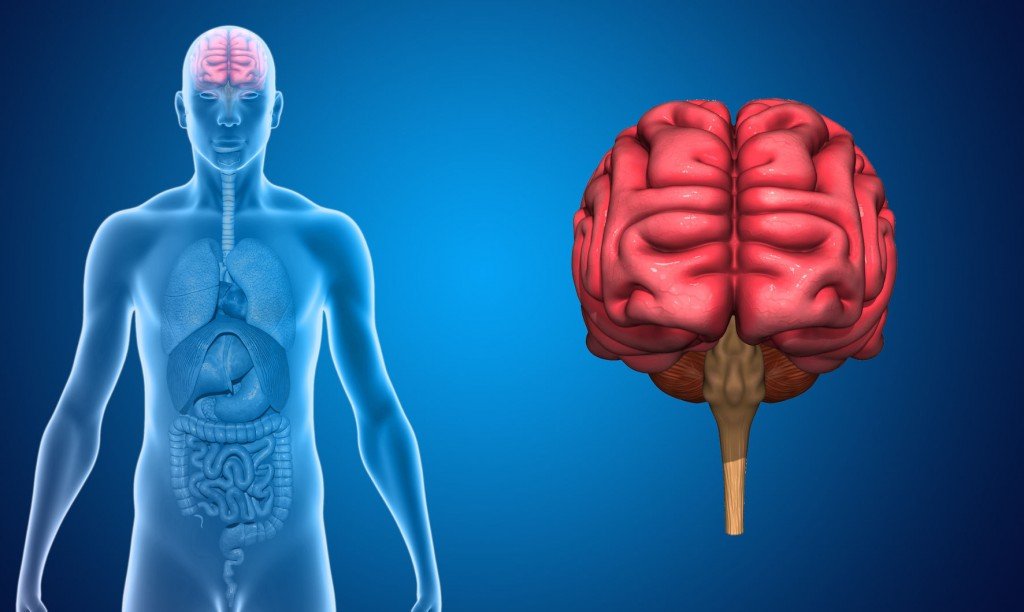Matthew Marturano, NMD
Early in my clinical training, I received some sage advice from several elders of the profession: When all else fails, look to the gut. Duly noted, I placed my attention on what I perceived to be more interesting matters such as biofeedback and mind-body techniques. By the time of my early career, I had found more value in nutritional therapies and nutrigenomics. On the occasions when these failed, I found myself first asking if this was due to attitude and later if this was due to the gut. It turns out that the answer is both.
The well-established comorbidity between gastrointestinal (GI) disorders (such as inflammatory bowel disorder and irritable bowel syndrome) and stress-related psychiatric symptoms continues to be elucidated for interdependence,1,2 and further lines of inquiry have been offered, along with quality assessment of study methods.3 As those who experience depression and anxiety will tell you, they can feel it in their gut. But which came first—the observer or the observed?
Fecal metagenome analysis has revealed 3 robust enterotypes of human gut microbiota that are not specific to any nation or continent.4 Enterotypes are strongly associated with long-term diets and consumption of protein and animal fat (Bacteroides, enterotype 1) and carbohydrates (Prevotella, enterotype 2); they remain identifiable despite transient changes due to food intake.5 Enterotype 3 has Ruminococcus as the main contributor to gut flora. Although it may be premature to suggest an enterotype diet, researchers have noted a close correspondence between the 3 enterotypes and orthologous groups representing certain functional differences; enterotype 1 has an overrepresentation of enzymes in the biotin biosynthesis pathway, while enterotypes 2 and 3 have an overrepresentation in the thiamine and haem biosynthesis pathways, respectively.3
Signaling between the brain and the GI tract is bidirectional, and homeostatic mechanisms exist at immunological, hormonal, and neural levels.6 Behavioral changes can be induced through stress-response pathways linked to the enteric microbiome such as those responses activated through corticotrophin-releasing factor7 and brain-derived neurotrophic factor8,9 in central and peripheral tissue. Psychological stress is also known to affect intestinal barrier function.10 The term brain-gut-enteric microbiota axis describes these interactions as a whole.11
Gut microbiota have also been implicated in brain development and behavior, including motor control12 and anxiety,13 although the exact mechanisms are unclear. Because reconstitution of microbiota did not normalize anxiety behaviors in germ-free (GF) mice,13 it may be that proper colonization of intestinal microbiota occurs during critical windows in development.
Treatment Options
Epidemiological evidence supports the use of mind-body therapies to treat mood disorders associated with inflammatory bowel disorder.14 However, strong data are lacking to indicate a beneficial effect on the course or activity of inflammatory bowel disorder.15
Probiotics continue to accrue positive results in clinical trials. They are beneficial in the treatment of the GI symptoms of disorders such as irritable bowel syndrome9 and have potential value as therapy for major depressive disorder.16 Treatment with Lactobacillus was associated with a significant decrease in anxiety symptoms among patients with chronic fatigue syndrome in a randomized, double-blind, placebo-controlled pilot study.17
Food substrate for intestinal microbiota is largely provided by dietary fiber and resistant starch, and several prebiotic formulations are on the market. Many contain inulin and fructo-oligosaccharides, although other oligosaccharides and some noncarbohydrates have been used as well. Preliminary research has revealed that bacterial use of prebiotics is substrate specific and species specific.18 Foods naturally high in prebiotic content include potato, onion, leek, Jerusalem artichoke, dandelion greens, asparagus, and banana. Consumption of these foods minimally ripened or cooked will help to maximize the prebiotic content.
Other treatment options include digestive enzyme and glutamine supplementation, as well as a host of herbal remedies aimed at supporting normal gut flora. Although it is still much a guessing-game on supplements, I have had promising results in most of my patients thus far with good case management, a GI function test, and a few wise words remembered. A little white light and positive intention do not hurt either.
Case Study 1
A 29-year-old athletic woman was seen with unexplained weight gain around the midsection, moodiness, and generalized anxiety. Other symptoms included hot flashes, brittle nails, new facial hair growth, acne, and tinea versicolor. She also reported positive results on a radioallergosorbent test for yeast, corn, and soy and was experiencing severe bloating on eating. In addition to bloating, the patient reported abdominal pain, changes in the odor of her stool, and the presence of mucus in her stool.
Further history revealed digestive challenges from birth. Although weighing 9 lb at birth, the patient was unable to tolerate breast milk and lost 3 lb before being switched to goat’s milk and being discharged from the hospital. At age 5 years, her parents were divorced, and she lived most of the time until age 10 years with her father, who was abusive (both physically and sexually). She is still estranged from her father.
Although at first she was more concerned about what she perceived to be hormonal and mental or emotional symptoms, the patient agreed to a digestive function test after I explained the potential connection between these symptoms and GI function. A digestive function test was ordered. Pending test results, the patient reported that her general practitioner had ordered abdominal ultrasonography, which revealed an enlarged ovarian cyst and several uterine fibroids. The digestive function test revealed suboptimal levels in 6 of 9 predominant bacterial strains and was positive for yeast or fungi and parasites, although the taxonomy was unavailable. In addition, the patient tested positive for Necator americanus (hookworm). Other findings were normal, except for moderately elevated triglycerides in her stool.
The patient began a supplement program that included a probiotic, a prebiotic, and a natural antimicrobial agent. A dose of pyrantel pamoate was recommended for the hookworm infestation. At the 6-week follow-up visit, the patient reported several positive changes. In addition to a significant reduction in her digestive symptoms and some weight loss, she had noticed improvements in her personality, feeling less moody and having more energy. She remarked: “It felt like a light came on! I felt back to myself. I haven’t felt this way in a year or 2!” The patient also reported distinct improvement in her eyesight immediately after taking the pyrantel. At a second follow-up visit, she was still improved, although some of the GI symptoms had started to return. A second dose of pyrantel was recommended, along with continuation of the supplement program.
Case Study 2
A 6-year-old boy was brought in by his mother, with several developmental issues. He was born with polydactyly of the hands and feet. At age 8 months, additional testing revealed an l-carnitine deficiency and an arachnoid cyst. At this time, the extra digits were excised. His mother further reported that he was unable to sit upright or crawl until age 14 months and did not walk until age 2 years.
At around age 3 years, he started displaying further symptoms, including fatigue on mental exertion, attention and short-term memory difficulties, frequent “spacing out,” and nocturnal enuresis. He also developed a feeding issue characterized by a lack of desire to chew his own food. His mother started homeschooling at age 5 years, and the developmental issues persisted despite his being on a Feingold diet and taking levocarnitine.
Further history revealed recurrent ear infections that had been treated with antibiotics, as well as persistent digestive complaints, including abdominal pain, gas and bloating, and blood in his stool. A digestive function test was ordered. The results revealed suboptimal levels in 5 of 9 predominant bacterial strains and was positive for yeast or fungi and parasites, with the specific taxonomy unavailable. Also noted were elevated fecal secretory IgA, antigliadin secretory IgA, and fecal fats.
A gluten-free diet was recommended. The patient began a supplement program that included chewable high-activity enzymes, a high-potency multispecies chewable probiotic, a helper T cell (type 1 and type 2) immune-supportive prebiotic formula, and l-glutamine powder, along with instructions for his mom to introduce the supplements slowly, one at a time, to see how he responded. At the 6-week follow-up visit, his mother reported that he had more energy consistency throughout the day, as well as increased attention and concentration during homeschooling.
After another 6 weeks, the improvements were even more marked. His reading, writing, and mathematics had improved, as well as his attention and memory. The patient was also starting to engage more with his mouth and had taken up chewing straws and snacking on popcorn. His motor skills and coordination were also improving. He is taking more of an interest in self-care behaviors such as brushing his teeth and tying his shoes. Bed-wetting occurs much less frequently; when it does, he is able to clean up after himself. The GI bloating subsided, and there has been no further blood in his stool.
 Matthew Marturano, NMD is a licensed naturopathic physician with a focus in gut ecology. His educational background includes a dual bachelor of science degree in biology and philosophy from the University of Michigan (Ann Arbor) and a doctorate of naturopathic medicine from the Southwest College of Naturopathic Medicine (Tempe, Arizona). Dr Marturano currently serves on the board of directors for the Michigan Association of Naturopathic Physicians and is the director of strategic development for Orchid Holistic Search (Madison Heights, Michigan).
Matthew Marturano, NMD is a licensed naturopathic physician with a focus in gut ecology. His educational background includes a dual bachelor of science degree in biology and philosophy from the University of Michigan (Ann Arbor) and a doctorate of naturopathic medicine from the Southwest College of Naturopathic Medicine (Tempe, Arizona). Dr Marturano currently serves on the board of directors for the Michigan Association of Naturopathic Physicians and is the director of strategic development for Orchid Holistic Search (Madison Heights, Michigan).
References
- Mawdsley JE, Rampton DS. The role of psychological stress in inflammatory bowel disease. Neuroimmunomodulation. 2006;13(5-6):327-336.
- Roman AL, Muñoz F. Comorbidity in inflammatory bowel disease. World J Gastroenterol. 2011;17(22):2723-2733.
- Camara RJ, Ziegler R, Begre S, Schoepfer AM, von Kanel R; Swiss Inflammatory Bowel Disease Cohort Study (SIBDCS) Group. The role of psychological stress in inflammatory bowel disease: quality assessment of methods of 18 prospective studies and suggestions for further research. Digestion. 2009;80(2):129-139.
- Arumugam M, Raes J, Pelletier E, et al. Enterotypes of the human gut microbiome. Nature. 2011;473(7346):174-180.
- Wu GD, Chen J, Hoffman C, et al. Linking long-term dietary pattern with gut microbial enterotypes. Science. 2011;334(6052):105-108.
- Grenham S, Clarke G, Cryan JF, Dinan TG. Brain-gut-microbe communication in health and disease. Front Physiol. 2011;2:e94. http://www.ncbi.nlm.nih.gov/pmc/articles/PMC3232439/?tool=pubmed. Accessed April 16, 2012.
- Kiank C, Taché Y, Larauche M. Stress-related modulation of inflammation in experimental models of bowel disease and post-infectious irritable bowel syndrome: role of corticotrophin-releasing factor receptors. Brain Behav Immun. 2010;24(1):41-48.
- O’Leary OF, Wu X, Castern E. Chronic fluoxetine treatment increases expression of synaptic proteins in the hippocampus of the ovariectomized rat: role of BDNF signaling. Psychoneuroendrocrinology. 2009;34:367-381.
- O’Mahony, McCarthy J, Kelly P, et al. Lactobacillus and Bifidobacterium in irritable bowel syndrome: symptom responses and relationship to cytokine profiles. Gastroenterology. 2005;128:541-551.
- Gareau MG, Silva MA, Perdue MH. Pathophysiological mechanisms of stress-induced intestinal damage. Curr Mol Med. 2008;8:274-281.
- Rhee SH, Pothoulakis C, Mayer EA. Principles and clinical implications of the brain-gut-enteric microbiota axis. Nat Rev Gastroenterol Hepatol. 2009;6:306-314.
- Heijtz RD, Wang S, Anuar F, et al. Normal gut microbiota modulates brain development and behavior. Proc Natl Acad Sci U S A. 2011;108(7):3047-3052.
- Neufield HA, Kang N, Bienenstock J, Foster JA. Effects of intestinal microbiota on anxiety-like behavior. Commun Integr Biol. 2011;4(4):492-494.
- Maunder RG, Levenstein S. The role of stress in the development and clinical course of inflammatory bowel disease: epidemiological evidence. Curr Mol Med. 2008;8(4):247-252.
- Rampton D. Does stress influence inflammatory bowel disease? the clinical data. Dig Dis. 2009;27(suppl 1):76-79.
- Logan AC, Katzman M. Major depressive disorder: probiotics may be an adjuvant therapy. Med Hypotheses. 2005;64:533-538.
- Rao AV, Bested AC, Beauline TM, et al. A randomized, double-blind, placebo-controlled pilot study of a probiotic in emotional symptoms of chronic fatigue syndrome. Gut Pathog. 2009;1(1):e6. http://www.ncbi.nlm.nih.gov/pmc/articles/PMC2664325/?tool=pubmed. Accessed April 16, 2012.
- Marotti I, Bregola V, Aloisio I, et al. Prebiotic effect of soluble fibres from modern and old durum-type wheat varieties on Lactobacillus and Bifidobacterium strains [published online ahead of print February 1, 2012]. J Sci Food Agric. doi:10.1002/jsfa.5597. Medline:22298124





